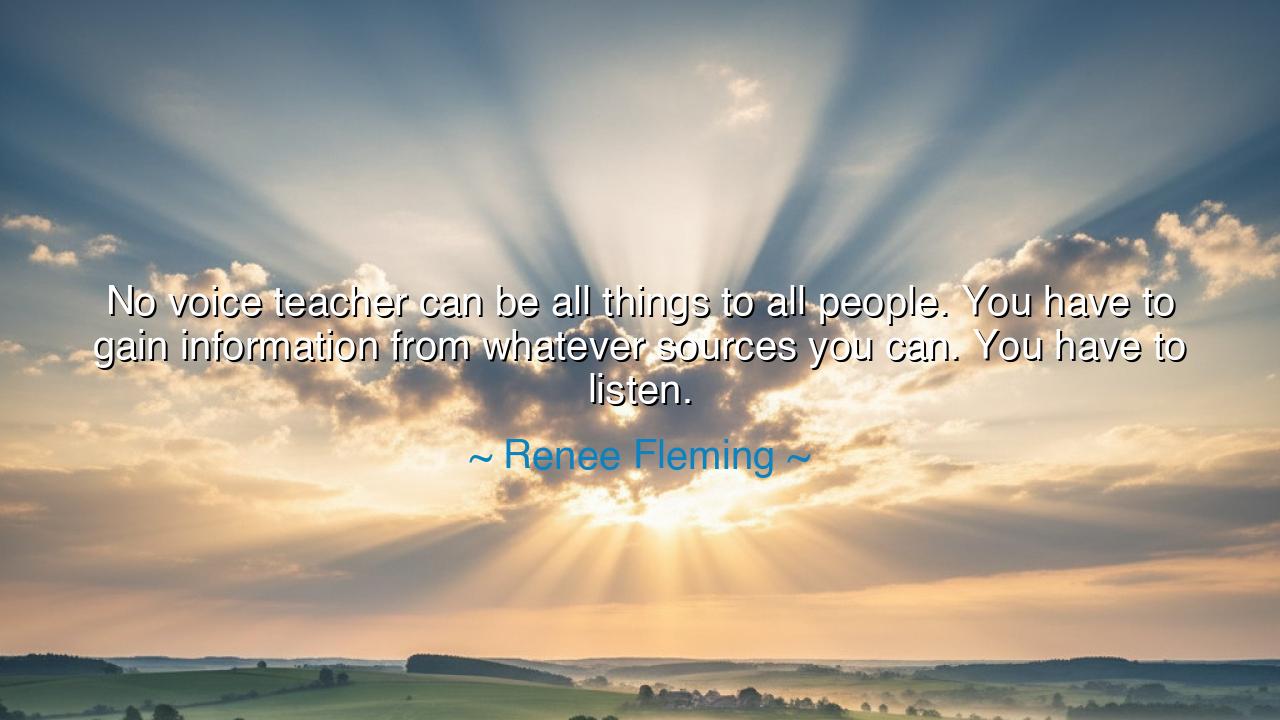
No voice teacher can be all things to all people. You have to
No voice teacher can be all things to all people. You have to gain information from whatever sources you can. You have to listen.






Renée Fleming, the radiant soprano whose voice has graced the grandest stages of the world, once spoke with the humility of a true seeker: “No voice teacher can be all things to all people. You have to gain information from whatever sources you can. You have to listen.” In these words, she unveils a truth that extends far beyond the art of singing. She reminds us that no single guide, no single master, no single path can encompass the fullness of learning. To grow, one must cultivate openness, the ability to listen deeply, and the willingness to gather wisdom wherever it appears.
The origin of this wisdom lies in the tradition of the artist’s journey. Every singer begins with a teacher, a mentor, a voice of guidance. Yet even the greatest teacher is but one vessel, carrying only a portion of truth. Fleming herself, who studied under many, understood that to master her craft she had to draw not from one well but from many—absorbing techniques, traditions, and even the unspoken lessons that come from listening not only to instructors, but to fellow musicians, audiences, and the silent guidance of her own body. Thus, she learned that knowledge is manifold, and humility the key to receiving it.
History provides luminous examples of this principle. Leonardo da Vinci was not content with a single master, but sought knowledge from painting, anatomy, engineering, and nature itself, weaving all into his genius. Bruce Lee, in martial arts, rejected rigid schools and proclaimed, “Absorb what is useful, discard what is not, add what is uniquely your own.” Even in the sacred realm, monks and mystics often journeyed to many teachers, listening, discerning, and then discovering the truth that transcended all forms. In each case, greatness arose not from one source, but from a chorus of influences, harmonized by the attentive mind.
The emotional power of Fleming’s words lies in her call to listen. For to listen is to humble oneself, to admit that wisdom is not finished in one voice, but scattered like seeds across many fields. The arrogant student closes the ear and clings to one source alone; the wise student opens the heart and gathers truth wherever it may grow. To listen is to treat the world itself as teacher: the voice of a friend, the silence of solitude, the echo of history—all become guides when one listens deeply.
Yet Fleming also acknowledges the limits of even the most devoted teachers. A voice teacher can shape technique, guide phrasing, polish tone—but cannot give a singer her soul, her story, her essence. That must be gathered by the artist herself, through experience, curiosity, and openness to life. Likewise, in all crafts, mentors can show the way, but cannot complete the journey. The fullness of mastery belongs to those who listen not only to their guides, but to the world, to themselves, and to the mystery that speaks through experience.
The lesson for us is clear: seek wisdom widely, and listen deeply. Do not expect one teacher, one book, or one experience to suffice. Instead, cultivate an ear that gathers knowledge from many sources and a heart that discerns what is true. Be open to unexpected teachers—a child’s innocent question, an elder’s quiet story, even the voice of failure itself. All can instruct, if you are willing to listen.
Practically, this means living as an active learner. When you sit before a teacher, honor them, but also seek beyond them. Read broadly, observe carefully, listen humbly, and reflect deeply. Do not cling to one method or voice, but weave together the wisdom of many into your own tapestry. For as Fleming teaches, no guide is all things, but each offers a piece of the whole. To listen is to gather those pieces and make of them a path uniquely your own.
Thus, Renée Fleming’s words endure as both caution and encouragement: do not expect completeness from one teacher, but cultivate the art of listening, and the world itself will become your school. O seeker, carry this truth with you: that to grow in mastery and in life, you must open your ears, your heart, and your spirit, and let wisdom flow from every voice that speaks to you. For in listening, you not only learn—you become.






AAdministratorAdministrator
Welcome, honored guests. Please leave a comment, we will respond soon